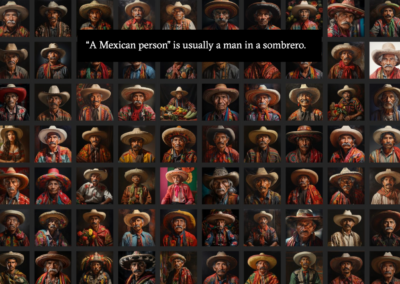Great news: You’ve gotten the go-ahead to add a really exciting new role to your team. The hiring process has officially begun, and you’ve just finished the first round of interviews. You received a slew of great applications, and even better—they all nailed their interviews! So who advances to the next round?
A sample project or work assignment might seem like the natural next step.
So you head back to your desk, draft an email to all of the candidates, and hit send. After all, it’s not really a project if it’s fun, right? It’ll help you weed out the candidates who aren’t as interested, and prioritize those who do the best work. They’ll also get to see what kind of work they might be doing in this role—a win-win.
Well, maybe not.
The problem with interview assignments
A resume and interview can only reveal so much about a candidate, which is why many companies often rely on “interview projects” to see someone’s work come to life, especially in marketing and creative roles. In certain industries, organizations often get away with these hiring methods. But does that mean they should?
The inherent risk and overall uncertainty of the hiring process will always exist for both parties—but the unpaid work some companies assign in the name of mitigating risk is both unfair and unethical.
We spoke with one of our Creative Talent Partners, Cait Mello, about this phenomenon. She shared that as a whole, asking artists, creatives or really any potential talent to complete unpaid work or provide creative ideas without compensation “should never even be a consideration.”
Cait explains, “It is unethical and usually takes advantage of hungry young creatives that just want an opportunity and are willing to compromise themselves because they haven’t built up their confidence yet.”
While we know how difficult it can be to find and evaluate talent—especially for niche roles or in competitive job markets— companies should never request work without appropriate compensation. To show that you respect your candidates’ (and potential future employees’) time and talent, it’s essential to stop asking for unpaid work.
Beyond the lack of respect, unpaid work in an interview process perpetuates inequities in the workforce.
“Who has the resources to do unpaid work?” Cait asks. “I’ll answer that for you: only people that already have money, or support from someone else. And if they don’t, you are preventing them from taking proactive steps towards economic stability.”
3 things to consider if your hiring process includes a project
So as tempting as it might be to request a “brief” project as part of your talent evaluation process, you should think about the following before you hit send.
1. Could you obtain the same information through other means?
Does this person have a portfolio or other work samples you’d be able to review? If so, ask for these first, and then evaluate what gaps need to be filled in. If you’re wondering if they can write well, ask for a handful of basic examples (that already exist).
For technical roles that require specific knowledge and skills, We Are Rosie’s People Ops Lead Tessa Dillenbeck says that you can include a short test in the allotted interview time.
“For example, a candidate would split the interview time by answering a few questions and then completing a data test,” Tessa explains. “This way, we can get a feel for their technical skills as well as their behavioral/situational skills, but we’re not asking them to spend their time completing the test outside of the interviews.”
2. Could you use another short interview to accomplish something similar?
Good interview questions and alternative assessment methods can get you plenty of information. For Tessa, that means being as direct as possible with questions like:
- Tell me about your approach to [insert important element of the role] and a time when you utilized that approach.
- How do you hold your teams accountable?
- How do you use data when making decisions?
- What is your strategy in [insert common scenario] situation?
3. Don’t waste time
Theirs or yours. Is the project something you’d consider ‘busywork?’ If yes, then why assign it? You probably won’t have time to review it, and they probably won’t have time to do it. Particularly if it feels generic and unexciting.
Evaluating talent: guidelines for assignments and projects
Trust us, we get it. We know first hand how hard it can be to find the perfect fit for a role—especially when you’re looking at an array of top-notch talent.
We’re not suggesting companies or organizations never ask for new work samples or specific assignments. If you do decide to go the project route, you can make sure it’s done with respect at the forefront. Here are a few guidelines.
If you’re asking for work, you need to pay for it. Period.
One option from Talent Partner Cait: “Provide a small payment for a first round of ideas or designs and include a contract that if a candidate isn’t hired but the concept or work is used in the future, they will receive X amount of compensation.”
Keep it ethical
Respect people’s intellectual property and remember that unless you have an explicit agreement, you don’t own a job candidate’s work. If you see potential for using their work down the line, you must negotiate this in advance, with their consent and compensation (see rule #1).
Consider a trial
If you’re really uncertain about whom to hire, take a flex talent lens to the hiring process: hire your top candidates on a paid basis to complete some real assignments. Depending on your budget, this may be tricky, but finding the right talent while also treating them fairly is essential in today’s job market—and it could save you money on hiring and recruiting in the long run.
Cait’s Advice: Start with a short contract or test period of a few months. Sometimes it takes a few weeks to get in the flow, and there might be a learning curve. Also, be sure to think about equity and inclusion. Not all people have the resources for training and internships but they might still have massive potential and drive. Don’t be so quick to judge someone based only on the pedigree of work experience and education that you find on their resume. Consider your talent with a wider lens, and give everyone time and training that can help them thrive.
The Bottom Line
Would you ask to “borrow” a piece of art to see how it looks in your living room before buying? Would you use a line of copy in an ad campaign before you actually hire the writer?
At We Are Rosie, we don’t think there’s any place for unpaid assignments in a job interview process. If you’re asking someone to do work, that work needs to be paid.
Though we know that most employers are well intentioned when asking for an interview project, the practice of assigning unpaid work in a hiring process is unfair, unethical, and outdated.
And if you do need to assign a (PAID) project, re-consider saying “just have fun with it”—because it is work after all!



